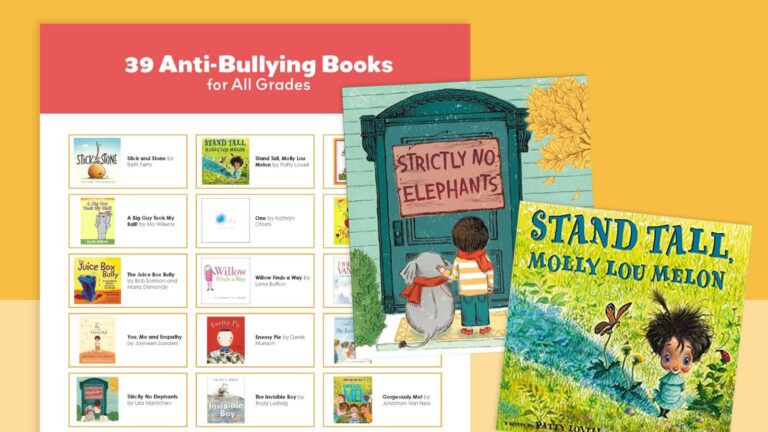Service learning projects have become an important part of school culture, and for good reason. These activities get kids involved in their communities, developing empathy and a sense of generosity. We’ve got project ideas that are ideal for kids of all ages, whether they’re working on their own, as a class, or with their families. Take a look and get inspired!
If you’re new to service learning projects, check out What Is Service Learning? and Service Learning 101: Making Learning Real and Relevant. Then check out our list of community service ideas below, and grab our free printable community service log bundle to help your students track their progress.
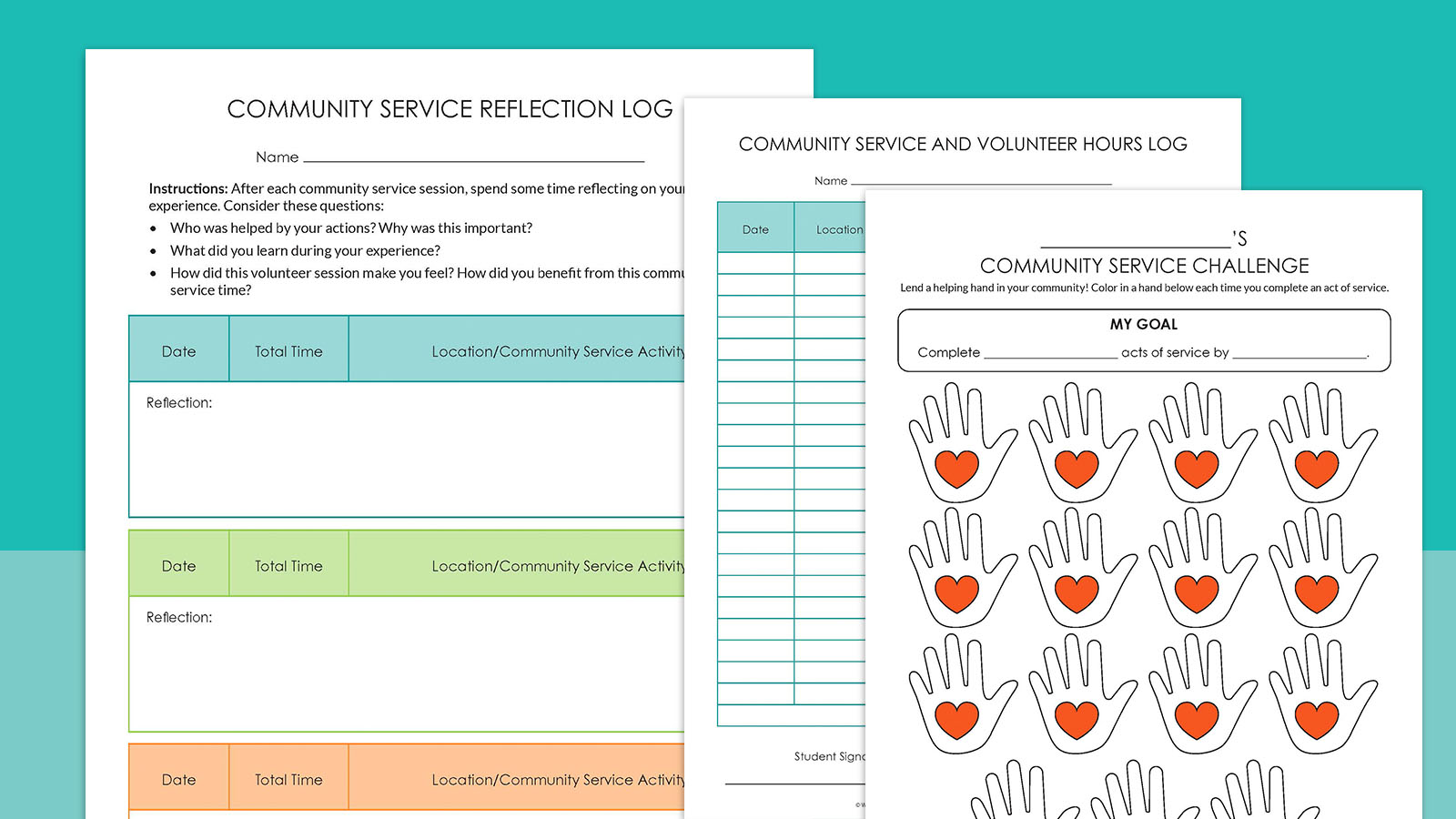
Jump to:
- Environmental and Outdoor Service Learning Projects
- School and Education Service Learning Projects
- Health and Wellness Service Learning Projects
- Community Support and Advocacy Service Learning Projects
Environmental and Outdoor Service Learning Projects
Plant trees
Join the Arbor Day Tree Campus K-12 program and turn your school campus into an arboretum, while teaching other students to become tree stewards for the future.
Support a park
Start by taking a field trip to a nearby local, state, or national park. Explore what it has to offer, but also consider what it needs to be even better. More picnic tables? Better interpretive signs? Inclusive playground equipment? A general litter cleanup? Students can propose these ideas to park officials and come up with ways to make them happen.
Participate in citizen science
Citizen science projects are terrific service learning ideas. Plant a milkweed monarch waystation, start a pollinator garden to help bees, or help track the progress of migrating species. You’ll find even more citizen science projects for kids here.
Clean up the community
Organize a roadside or park cleanup day, where students and community members gather to pick up litter and tidy your shared spaces. Then, come up with unique and creative ideas to stop littering for good!
Host a trash-to-art show
Invite students and members of the public to upcycle old items and even trash into incredible art projects. If you live in a coastal area, check out the Washed Ashore program. You can work with them to bring their show to your own community.
Conduct an energy audit
Help your school buildings conserve energy by evaluating the usage of lights, computers, and other electrical devices. Or start a campaign to encourage families to conduct their own energy audits and make important changes at home. Learn more from the U.S. Department of Energy.
Spread the word on composting
Composting is an efficient way to use up food and organic waste and create rich, healthy soil in its place. Work with your food services department to create a compost pile at school, or teach families how to compost at home. You could even set up a community composting station. The EPA has good information to get you started.
Install rain barrels
Conserve water by channeling rain into barrels for use in watering gardens during drier days. Put them in at school for school gardens, or help families create and install rain barrels at home. Here’s how rain barrels work.
School and Education Service Learning Projects
Start a school recycling program
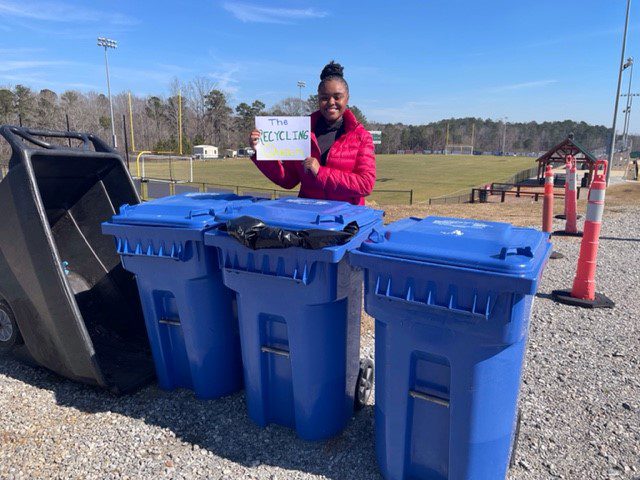
Go green! Get all the resources you need to set up and run a stellar school recycling program here. Already have one? Encourage students to find ways to make it even more effective.
Create a school or community garden
Even when food insecurity isn’t an issue, healthy eating often is. Junk food is often cheaper than healthy food, and many people don’t have ready access to a place to grow their own fruits and veggies. A school or community garden lets kids dig their hands into the soil and help provide some much-needed fresh produce for others. The USDA has some tips here to help you get started.
Beautify your school
Does your school have a graffiti, trash, or vandalism problem? Even if it doesn’t, we bet your hallways and grounds could be a little brighter and more welcoming. Give students a sense of ownership by having them paint murals, decorate the hallways, or spruce up the bathrooms.
Fight bullying by creating student upstanders
The most meaningful anti-bullying programs are the ones that students start themselves. Start a service learning project that inspires others to stand up to bullying when they see it. Here’s more about empowering student upstanders.
Take part in the St. Jude Math-a-Thon
The St. Jude Math-a-Thon is designed to work with your school’s existing curriculum. Students raise money from friends and family and solve math problems in grade-specific Funbooks, developed by Scholastic. Students also learn how math plays an important role in the lifesaving work happening every day at St. Jude.
Organize a book drive
Reading Is Fundamental believes that every kid deserves to learn how to read and to have books to enjoy. Team up with the organization to run a local book drive, and check out some of their other volunteer opportunities too. Books for Africa is another terrific organization that needs your book donations.
Provide translation services
Chances are your school produces its communications in English alone. But it’s likely that not everyone in your community speaks English fluently. Reach out to all members of your community by translating your school materials into other languages spoken locally. Kids in foreign language classes can do some of the work themselves, or they can seek out neighbors and friends who might be able to help.
Tutor or set up peer mentoring programs
Older kids helping younger kids—what a great way to build a sense of community! Pair students to create a buddy system, or organize a tutoring program run entirely by kids. Learn more about peer mentoring programs here.
Health and Wellness Service Learning Projects
Train guide dogs
Train or foster guide dogs or help with administrative tasks for Guide Dogs for the Blind. Puppy raisers can be any age, whether you’re 9 or 90. No prior experience is necessary!
Craft blankets for kids
Sew, knit, or crochet security blankets for children in hospitals or otherwise in need through Project Linus. Pair this project with a book or toy drive for sick kids; teens can also look into volunteer opportunities at their local hospitals.
Run a food drive
Food insecurity remains a major issue in our country, and organizing a food drive is a classic service learning project. Visit Feeding America to find organizations that need your help.
Serve at a food pantry
Many kids can’t imagine what it’s like not knowing where your next meal will come from. Help develop their sense of empathy by volunteering at food pantries or soup kitchens. Make it a regular activity so they can form bonds with the local community members. FoodPantries.org has a list of places that welcome volunteers.
Sculpt empty bowls to feed the hungry
This idea is part art project and part service learning. Kids sculpt and decorate ceramic bowls, then use them to host a fundraising event that raises money for local food pantries and other organizations.
Hold a hygiene drive
Food isn’t the only necessity that some people struggle to provide for their families. They also need soap, toothpaste, deodorant, period products, and other hygiene supplies. Work with local shelters to find out what they need, and hold a drive to collect those items. Or order a Soap Saves Lives Box and assemble kits to be distributed at local food pantries or other locations.
Support mental health in your school or community
Kids today face a variety of mental health challenges, but they’re also more aware of the importance of good mental health than previous generations. Students who want to support mental health among their peers can develop a service learning project that makes a real difference. Discover empowering mental health activities for teens here.
Build Busy Boxes for hospitals
Sick kids who spend lots of time in the hospital welcome new ways to keep busy. That’s where Busy Boxes come in! Run a drive to collect small toys, games, puzzles, and more. Then package them up (for even more fun, decorate the boxes!) and donate them to children’s hospitals and other facilities that help sick kids. (via That After School Life)
Start Meatless Mondays
Meatless Mondays aren’t about promoting vegetarianism or veganism. They’re simply a way to encourage us all to consider the impact eating meat has on the planet (it might surprise you!). Kids can try Meatless Mondays at home, plus work with their school cafeteria to offer meals without meat that day too. Learn about the Meatless Monday campaign here.
Host a St. Jude Trike-a-Thon
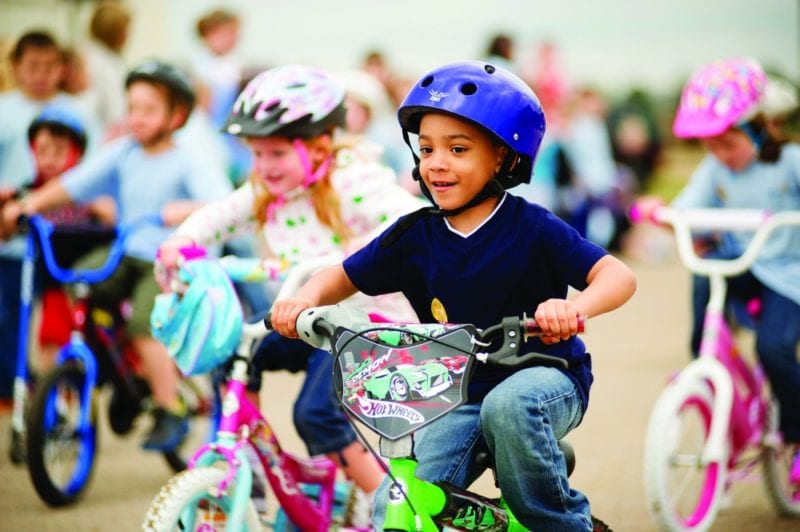
Preschool and day-care children will learn about trike and riding-toy safety and the importance of helping others, all while having fun and earning prizes. Launched in 1983, St. Jude Trike-a-Thon fundraisers provide educators with a weeklong curriculum that includes a series of interactive lessons with two charming characters, Bikewell Bear and Pedals the Bunny. Educational materials—storybooks, videos, and coloring books—that support learning are also provided. All of this adds an educational bent to your big trike event and your efforts for St. Jude! Click here to find out more.
Community Support and Advocacy Service Learning Projects
Welcome a refugee family
Thousands of people flee their homelands and seek asylum in the United States every year. Getting here is just one part of a long and often difficult journey. Communities can help refugees settle in and feel at home by working with Refugee Council USA. This is a wonderful project for students and parents to work on together.
Start an awareness campaign
Once kids find an issue near and dear to their hearts, they’ll jump wholeheartedly into spreading the word. The great thing about awareness campaigns is that the topic can be just about anything: anti-bullying, healthy lifestyles, environmental issues, and on and on. Kids really get a chance to be creative with these campaigns, with something to build on everyone’s strengths. Learn how to plan an awareness campaign here.
Walk for Water
Open students’ eyes to what it means to live without easy access to clean water with a 5K like no other. Participants complete the race carrying a gallon of water, like so many people around the world must do multiple times each day. Learn about this incredible service learning project from H2O for Life here.
Build homes for community members
When members of the community come together with families in need to build new homes from the ground up, everyone reaps the rewards. The Habitat for Humanity Youth Programs provide a variety of volunteer opportunities for kids as young as 5.
Thank our troops
Say thank you in a meaningful way to troops serving overseas by volunteering to assemble care packages for Operation Gratitude. You can also organize a letter-writing or holiday-card campaign.
Collaborate on community art
Take a look around your neighborhood and find a place that could use an injection of creativity. Then plan a project where students work with members of the community to make something beautiful! Check out our collection of fun collaborative art projects here.
Socialize with senior citizens
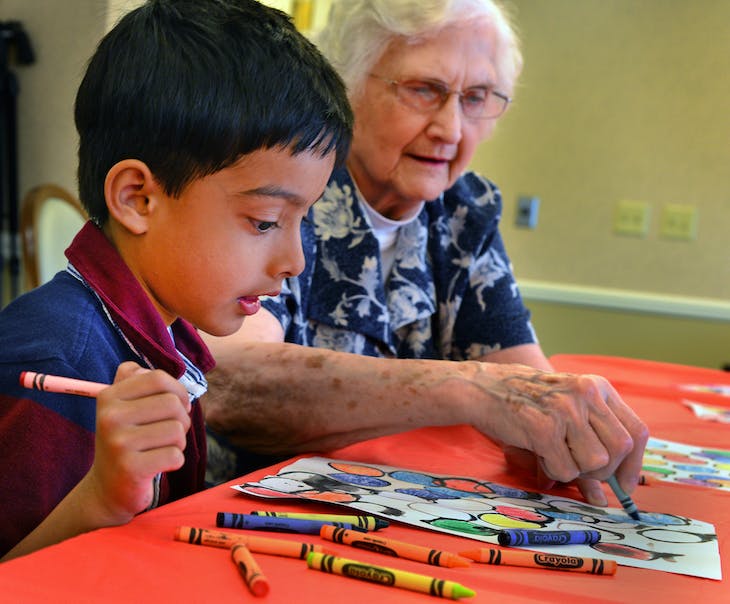
Getting older can sometimes be lonely, especially for those in nursing homes and other senior facilities. There are lots of ways for kids to help, from sending letters and cards to spending time reading with or to a senior buddy. Find more ways for kids to volunteer with seniors here.
Knit for charity
Knitting helps kids build their manual dexterity and improves hand-eye coordination. Combine those benefits with charitable giving to create a fun, creative service learning project. Organizations like Hats 4 the Homeless and Warm Up America take your knitted goods and get them to those who need them. Find a whole list of knitting charities here.
Help a local animal shelter
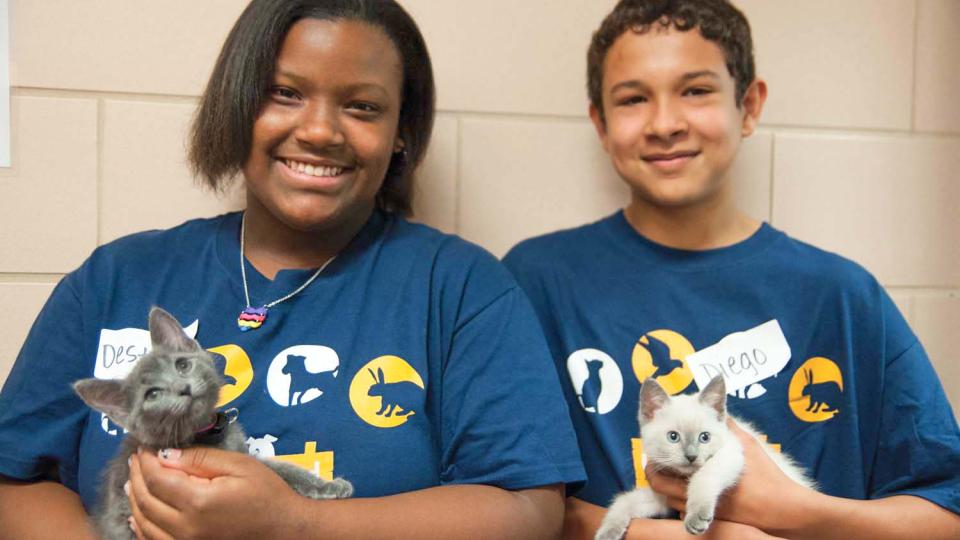
Animal-loving kids will be thrilled to help local pets in need. Some shelters have minimum age requirements for volunteers, but they often desperately need supplies and toys that kids can help collect. Plus, their animals are always looking for good homes! Challenge your kids to come up with creative ways to match homeless pets with their forever families. Contact your local shelter, or visit the ASPCA’s website for ideas.
Get your free printable community service log bundle!
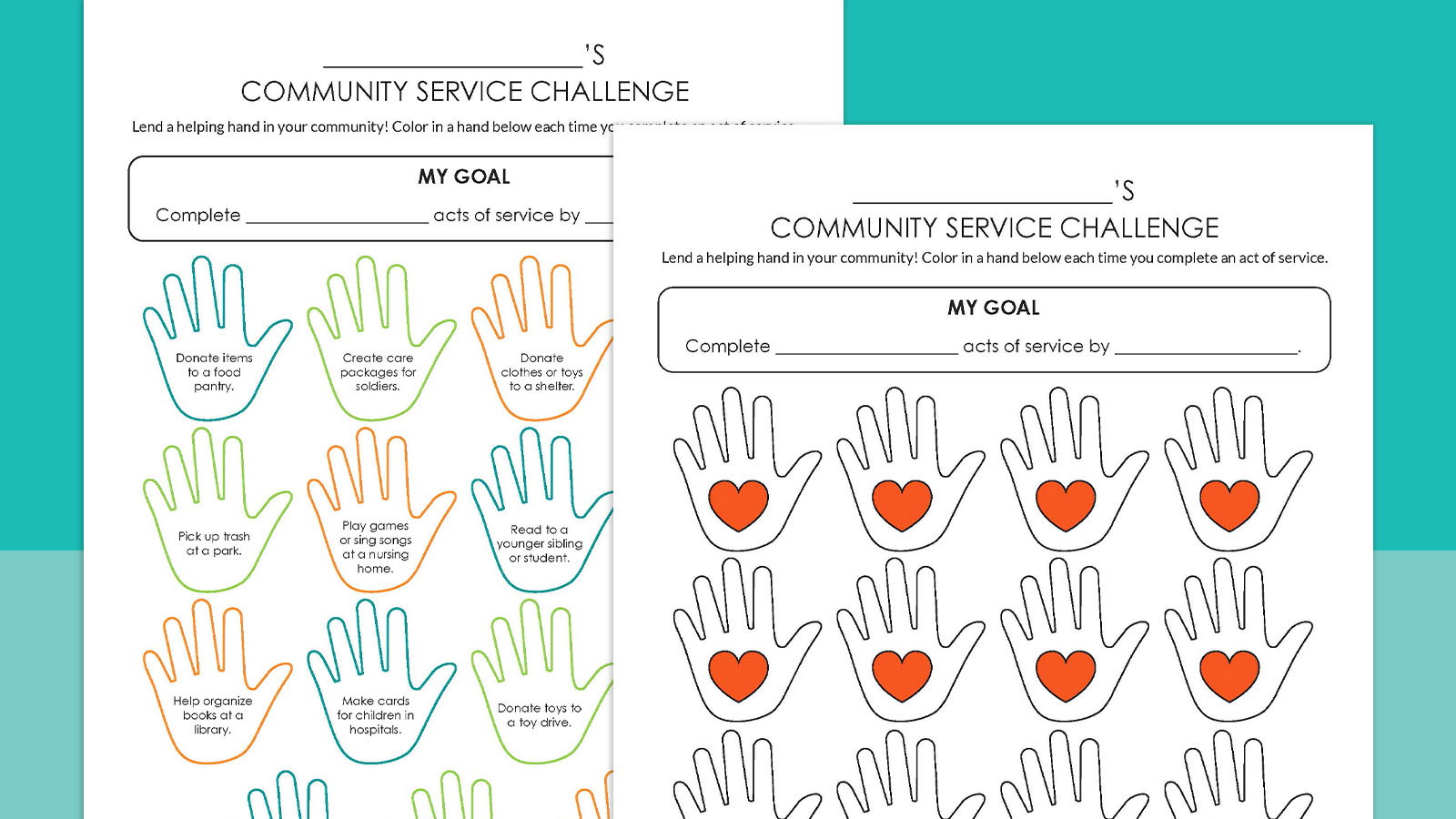
Be sure to grab our free community service tracking sheets, making it easy for your students to keep a community service log. The bundle includes options for both younger and older students.

